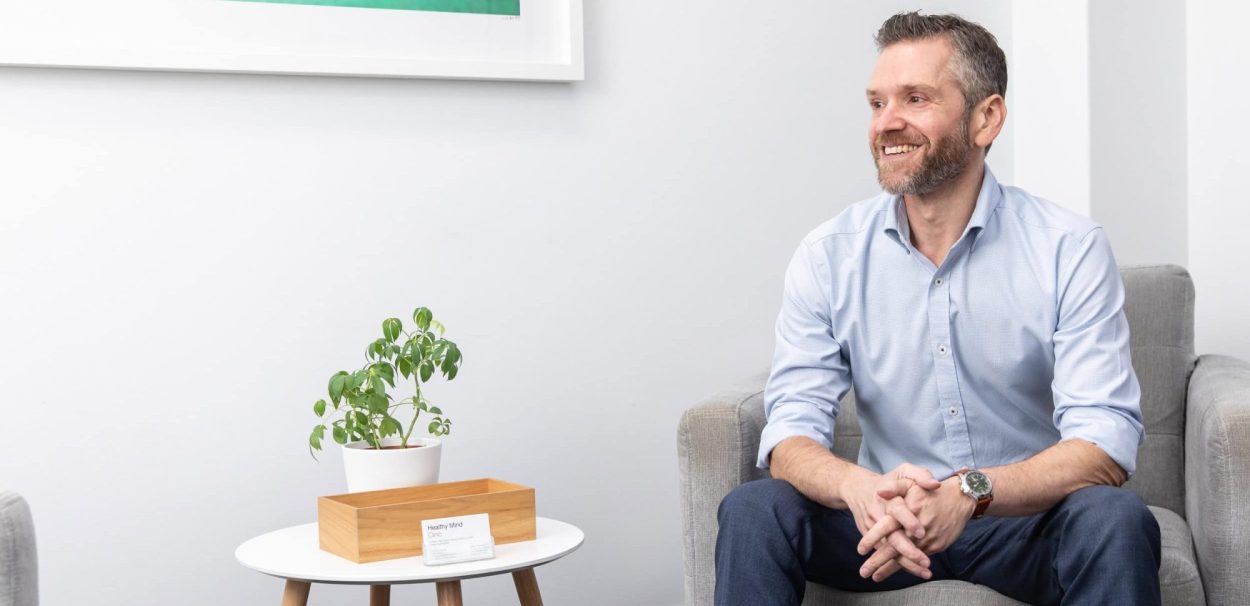
29 May Five tips to help overcome anxiety
If you’ve been feeling more anxious lately and you want to overcome anxiety, you’re not alone. A recent study found that people ran internet searches for terms like “anxiety”, “anxiety attack” and “panic attack” significantly more shortly after the COVID-19 pandemic was declared. On top of that, anxiety disorders are the most common type of mental health disorder in Australia – about 14% of people experience an anxiety disorder each year. In a population of 25 million people that means about 3.5 million people each year have an anxiety disorder. A lot.
The good news is that there are safe, effective ways to overcome troubling anxiety. These are based on an approach called cognitive behavioural therapy (CBT), one of the most effective treatments for anxiety disorders. Here are five tips to start overcoming anxiety.
Slow your breathing
As anxiety increases, so does your breathing rate. This can keep anxiety going as faster breathing knocks out the balance between carbon dioxide and oxygen in your system (I’ll explain more about that in another post). Your body then takes that as a signal that danger remains, so anxiety continues (as anxiety is a response to the presence or risk of danger). Instead, try to slow your breathing using a technique called controlled breathing. This means breathing slowly through your nose (for about 3 to 5 seconds), pause briefly (for about 2 seconds), breathe out slowly through your mouth through pressed lips (for about 3 seconds), pause briefly (for about 2 seconds). Repeat. Do this for at least 5 minutes.
Use helpful thinking
In situations that make us anxious, it’s often the thoughts we have about the situation that drive anxiety, rather than the situation itself. That means that handling these thoughts differently can help you reduce anxiety. If you notice anxious thoughts like “I’ll stuff this up,” “It will be a disaster,” or “everyone will think I don’t know what I’m talking about” then don’t believe those thoughts just because they happen. They’re probably not completely right anyway. Seriously – how is it possible to read the future and to know what other people think? Aim to shift to more helpful realistic thoughts. For example, “Some people will be interested in what I say and some may be less interested, but it won’t really have a big impact on me.”
Approach anxiety-provoking situations in steps
This is based on an approach in CBT called graded exposure. This is a way of slowly learning to confront anxiety-provoking situations so that you can master and reduce your anxiety. Think of it like climbing a staircase. Jumping straight to the top step is hard. But, taking one step at a time is an easier way to get to the top. Mastering anxiety is the same. Choose a situation that makes you anxious, and break approaching it into steps. Then take it one step at a time. For example, presenting to a group may be hard for someone who has social anxiety. Rather than starting there, it may be easier to start with occasionally asking questions in a group and doing that several times to get used to it. Once you’ve reduced anxiety in that situation, your next step may be to tell a small group of people (eg work colleagues) what you did on the weekend and get used to that. Then add steps gradually that get a little more difficult each time to build up to the step of presenting to a group.
Focus on one anxiety at a time
There may different things that make you feel anxious. Trying to master all of those at once can be difficult. Aim to reduce anxiety about one thing a time. Then move on to the next one.
Give yourself time to overcome anxiety
Mastering anxiety takes time. Allow yourself time to learn to master and cope with anxiety. Your anxiety likely didn’t arrive overnight, so it won’t leave overnight either. Think of it like building fitness. Reducing anxiety comes with regular practice.
We specialise in the treatment of anxiety and depression in Sydney. If you’d like assistance with managing how you feel, please contact us on (02) 9119 8778 or email us on reception@healthymindclinic.com.au. We provide appointments in person, by phone and by video. Rebates from Medicare and your private health fund may be available for appointments.
If you are in a mental health emergency, please contact Lifeline 13 11 14, the Mental Health Line 1800 011 511, Emergency 000 or go to your nearest hospital emergency department.

